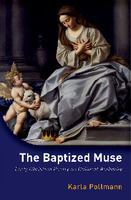The Baptized Muse
Early Christian Poetry as Cultural Authority
| dc.contributor.author | Pollmann, Karla | |
| dc.date.accessioned | 2018-10-03 09:09:28 | |
| dc.date.accessioned | 2020-04-01T12:57:45Z | |
| dc.date.available | 2020-04-01T12:57:45Z | |
| dc.date.issued | 2017 | |
| dc.identifier | 645587 | |
| dc.identifier | OCN: 971364910 | en_US |
| dc.identifier.uri | http://library.oapen.org/handle/20.500.12657/30511 | |
| dc.description.abstract | With the rise of Christianity in the Roman Empire, increasing numbers of educated people converted to this new belief. As Christianity did not have its own educational institutions, the issue of how to harmonize pagan education and Christian convictions became increasingly pressing. Especially classical poetry, the staple diet of pagan education, was considered morally corrupting (because of its deceitful mythological content) and damaging for the salvation of the soul (because of the false gods it advocated). But Christianity recoiled from an unqualified anti-intellectual attitude, while at the same time the experiment of creating an idiosyncratic form of genuinely Christian poetry failed (the sole exception being the poet Commodianus). This book argues that, instead, Christian poets made creative use of the classical literary tradition, and—in addition to blending it with Judaeo-Christian biblical exegesis—exploited poetry’s special ability of enhancing the effectiveness of communication through aesthetic means. It seeks to explore these strategies through a close analysis of a wide range of Christian, and for comparison partly also pagan, writers mainly from the fourth to sixth centuries. The book reveals that early Christianity was not a hermetically sealed uniform body, but displays a rich spectrum of possibilities in dealing with the past and a willingness to engage with and adapt the surrounding culture(s), thereby developing diverse and changing responses to historical challenges. By demonstrating throughout that authority is a key in understanding the long denigrated and misunderstood early Christian poets, this book reaches the ground-breaking conclusion that early Christian poetry is an art form that gains its justification by adding cultural authority to Christianity. Thus, in a wider sense this book engages with the recently emerged scholarly interest in aspects of religion as cultural phenomena. | |
| dc.language | English | |
| dc.subject.classification | thema EDItEUR::D Biography, Literature and Literary studies::DB Ancient, classical and medieval texts | en_US |
| dc.subject.classification | thema EDItEUR::Q Philosophy and Religion::QR Religion and beliefs::QRM Christianity | en_US |
| dc.subject.classification | thema EDItEUR::Q Philosophy and Religion::QR Religion and beliefs::QRA Religion: general::QRAX History of religion | en_US |
| dc.subject.other | early christian literature | |
| dc.subject.other | poetic aesthetics | |
| dc.subject.other | anti-intellectualism | |
| dc.subject.other | pagan education | |
| dc.subject.other | biblical exegesis | |
| dc.subject.other | religion and culture | |
| dc.subject.other | myth | |
| dc.subject.other | cultural authority | |
| dc.subject.other | classical literary tradition | |
| dc.subject.other | late antiquity | |
| dc.subject.other | God | |
| dc.subject.other | Paganism | |
| dc.subject.other | Virgil | |
| dc.title | The Baptized Muse | |
| dc.title.alternative | Early Christian Poetry as Cultural Authority | |
| dc.type | book | |
| oapen.identifier.doi | 10.1093/acprof:oso/9780198726487.001.0001 | |
| oapen.relation.isPublishedBy | b9501915-cdee-4f2a-8030-9c0b187854b2 | |
| oapen.relation.isbn | 9780198726487 | |
| oapen.pages | 288 | |
| oapen.remark.public | Relevant Wikipedia pages: God - https://en.wikipedia.org/wiki/God; Paganism - https://en.wikipedia.org/wiki/Paganism; Virgil - https://en.wikipedia.org/wiki/Virgil | |
| oapen.identifier.ocn | 971364910 |

